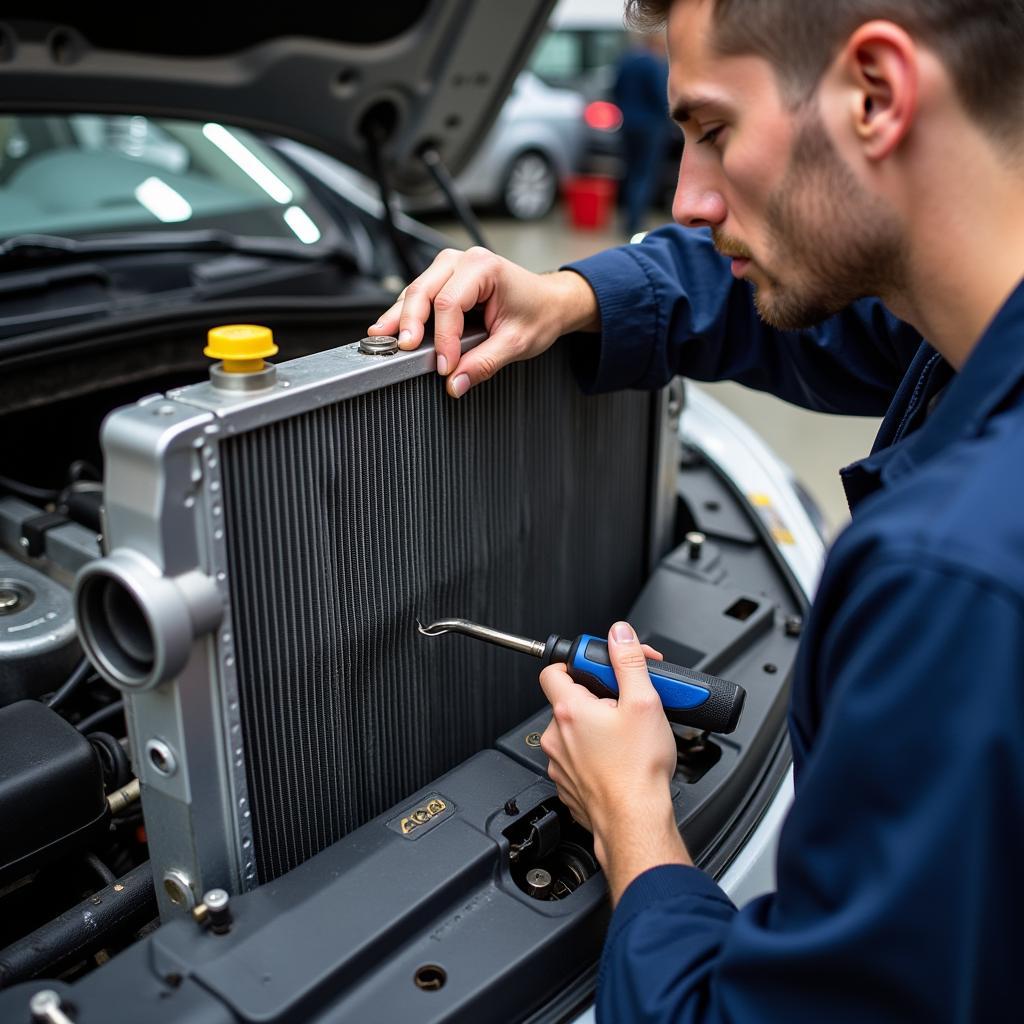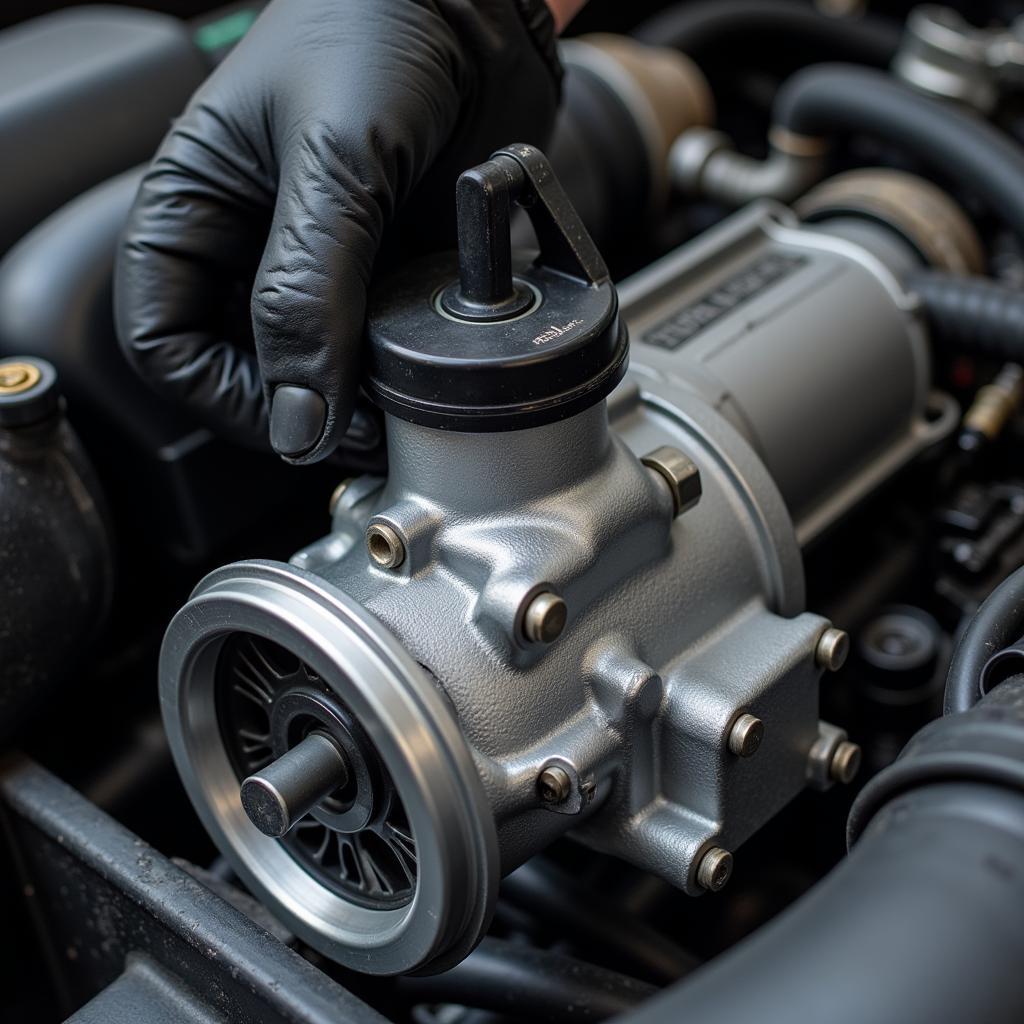Overheating car problems are a common source of frustration for drivers. From minor annoyances to major engine damage, understanding the causes and solutions is crucial for maintaining your vehicle’s health and longevity. This guide provides a detailed look into the intricacies of overheating, offering practical advice for both car owners and professional mechanics.
Do you suspect your car has smart car overheating problems? Let’s dive deeper into this widespread issue.
Understanding the Causes of Car Overheating Problems
Several factors can contribute to an overheating engine. A malfunctioning cooling system is often the primary culprit. This system, comprised of the radiator, water pump, thermostat, and hoses, works to regulate the engine’s temperature. When any of these components fail, the engine can quickly overheat.
Low coolant levels are another common cause. Coolant, a mixture of water and antifreeze, absorbs heat from the engine and dissipates it through the radiator. If the coolant level is too low, the system can’t effectively cool the engine.
Beyond the cooling system itself, external factors like extreme weather conditions can also play a role. In hot weather, the engine has to work harder to stay cool, increasing the risk of overheating.
Identifying the Symptoms of an Overheating Engine
Recognizing the signs of an overheating engine is critical to prevent serious damage. The most obvious sign is a high temperature reading on the dashboard gauge. Other symptoms include steam rising from the hood, a sweet, burning smell, and a knocking or pinging sound from the engine.
If you notice any of these signs, it’s crucial to pull over immediately and turn off the engine. Continuing to drive with an overheating engine can lead to catastrophic engine failure.
Diagnosing and Troubleshooting Overheating Issues
Diagnosing the exact cause of overheating can be complex. A thorough inspection of the cooling system is essential. This involves checking the coolant level, inspecting the radiator for leaks or blockages, testing the thermostat, and examining the water pump for proper operation.
 Mechanic Inspecting Radiator of Overheating Car
Mechanic Inspecting Radiator of Overheating Car
Are you dealing with radiator problems car overheating? Addressing radiator issues is crucial for preventing further problems.
Common Overheating Car Problems and Solutions
Low Coolant Levels
If the coolant level is low, simply adding more coolant can often solve the problem. However, it’s important to identify the underlying cause of the low coolant. A leak in the cooling system should be addressed immediately to prevent recurring issues.
Faulty Thermostat
A malfunctioning thermostat can prevent the coolant from circulating properly. Replacing the thermostat is a relatively simple and inexpensive repair that can resolve this issue.
Radiator Problems
Causes of car overheating problems often stem from a faulty radiator. A clogged or damaged radiator can restrict coolant flow, leading to overheating. Repairing or replacing the radiator might be necessary.
Water Pump Failure
The water pump circulates the coolant through the engine and radiator. A failing water pump can cause overheating, requiring replacement.
 Car Water Pump Replacement
Car Water Pump Replacement
“Regular maintenance, including coolant flushes and system checks, is the best way to prevent overheating problems,” says John Davis, a seasoned automotive engineer with over 20 years of experience. He adds, “Early detection and prompt action are crucial to minimize damage and keep your car running smoothly.”
Preventing Overheating in Your Car
Regular maintenance is key to preventing overheating. This includes regular coolant flushes, checking the coolant level, and inspecting the cooling system components for wear and tear. Addressing any issues promptly can prevent them from escalating into major problems.
“Ignoring minor cooling system issues can lead to significant engine damage down the road,” cautions Maria Sanchez, a certified mechanic and automotive instructor. “Investing in preventative maintenance is always more cost-effective than dealing with major repairs.”
Conclusion
Problems Overheating Car can range from minor inconveniences to major engine damage. Understanding the causes, symptoms, and solutions is essential for any car owner. Regular maintenance, prompt attention to warning signs, and professional diagnosis are key to preventing and addressing overheating issues. Remember, addressing these issues early can save you time, money, and frustration in the long run. Contact AutoTipPro at +1 (641) 206-8880 or visit our office at 500 N St Mary’s St, San Antonio, TX 78205, United States for assistance with your overheating car problems.
Is your new car radio causing speaker problems? While seemingly unrelated, sometimes electrical issues can cascade and affect other systems. It’s best to get any car problems checked out by a professional.
Are the 05 cadillac cts a problem car in terms of overheating? Researching specific models can give you insights into potential issues.
FAQ
-
What should I do if my car overheats while driving? Pull over immediately, turn off the engine, and allow it to cool down.
-
How often should I check my coolant level? At least once a month, and more frequently in hot weather.
-
What is the difference between coolant and antifreeze? Antifreeze is a concentrated solution that is mixed with water to create coolant.
-
Can I drive my car if it’s slightly overheating? No, it’s best to pull over and address the issue to prevent further damage.
-
How much does it cost to fix an overheating car? The cost depends on the underlying cause and can range from a few dollars to several hundred or even thousands.
-
How can I prevent my car from overheating in the summer? Ensure your cooling system is in good working order, check your coolant levels regularly, and avoid prolonged idling in hot weather.
-
What is the most common cause of car overheating? Low coolant levels, a faulty thermostat, or problems with the radiator are the most frequent culprits.






Leave a Reply